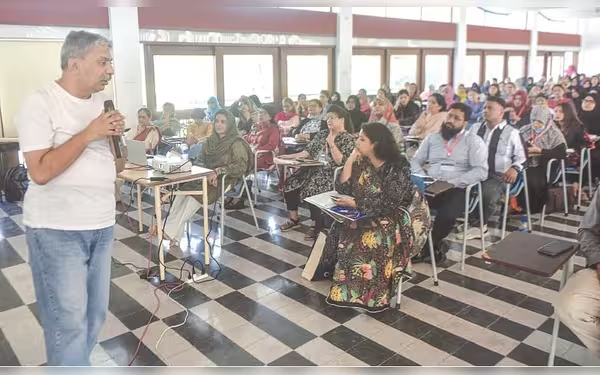Sunday, December 22, 2024 03:18 AM
AI's Impact on Education: Insights from SPELT Conference in Karachi
- Experts discuss AI's role in education at SPELT conference.
- Dr. Shah Jamal Alam highlights AI's potential and pitfalls.
- Educators urged to balance innovation with core educational values.
 Image Credits: dawn
Image Credits: dawnExperts at the SPELT conference in Karachi discuss the potential and challenges of AI in education, emphasizing the need for responsible integration.
KARACHI: The rapid advancement of Artificial Intelligence (AI) has sparked a significant conversation about its role in education. As technology continues to evolve, educators are faced with both exciting opportunities and daunting challenges. The recent 40th Society of Pakistan English Language Teachers (SPELT) International Conference, held over two days at five different venues in Karachi, provided a platform for experts to discuss these very issues. The theme of the conference, ‘Transitions in ELT: Past, Present and Future,’ highlighted the need for educators to adapt to the changing landscape of teaching and learning.
During the conference, attendees engaged in various sessions, including keynote addresses, panel discussions, and interactive workshops. The atmosphere was charged with enthusiasm as teachers, usually seen guiding their students, took on the role of learners themselves. They arrived equipped with program books and study materials, ready to absorb new knowledge and insights.
In his welcome address, SPELT president Mohsin Tejani emphasized the organization’s commitment to enhancing professional development for teachers. He stated, “We are committed to harnessing technology in our mission of teaching as we make professional development accessible for teachers to adapt to the future landscape.” This sentiment resonated throughout the conference, as educators recognized the importance of integrating technology into their teaching practices.
One of the highlights of the event was the keynote address by Dr. Shah Jamal Alam, an associate professor of Computer Science at Habib University. His presentation, titled ‘Generative AI and the Future of Education,’ delved into the potential and pitfalls of AI in the educational sector. Dr. Alam pointed out that AI is now an integral part of our lives, stating, “AI touches you one way or the other. It is part of life.” He reflected on Google’s ambitious project to digitize all the books in the Library of Congress, noting that while it promised accessibility, it ultimately fell short of delivering the wealth of knowledge to individuals.
Dr. Alam raised critical concerns about the implications of AI in academia, particularly regarding the authenticity of research and the potential for plagiarism. He illustrated this point by discussing how AI can generate text and images, even creating fictional scenarios, such as a photograph of Leonardo da Vinci with the Mona Lisa. This raises questions about the reliability of AI-generated content and its impact on the integrity of academic work.
Moreover, Dr. Alam highlighted the ethical dilemmas posed by AI, including the risk of perpetuating biases present in the data it is trained on. He remarked, “We created a technology, not knowing what it can do, but we are finding out as AI gives us a distorted mirror image.” This statement serves as a reminder that while AI can enhance educational experiences, it also requires careful consideration and responsible use.
As educators navigate the complexities of integrating AI into their teaching, it is crucial to strike a balance between embracing innovation and maintaining the core values of education. The discussions at the SPELT conference underscored the importance of equipping teachers with the tools and knowledge necessary to harness AI effectively. By doing so, educators can not only enhance their teaching practices but also prepare students for a future where technology plays an increasingly prominent role.
The dialogue surrounding AI in education is just beginning. As technology continues to evolve, it is essential for educators to remain informed and adaptable. By fostering a culture of continuous learning and open-mindedness, teachers can ensure that they are not only keeping pace with technological advancements but also shaping a future where education thrives in harmony with innovation.












